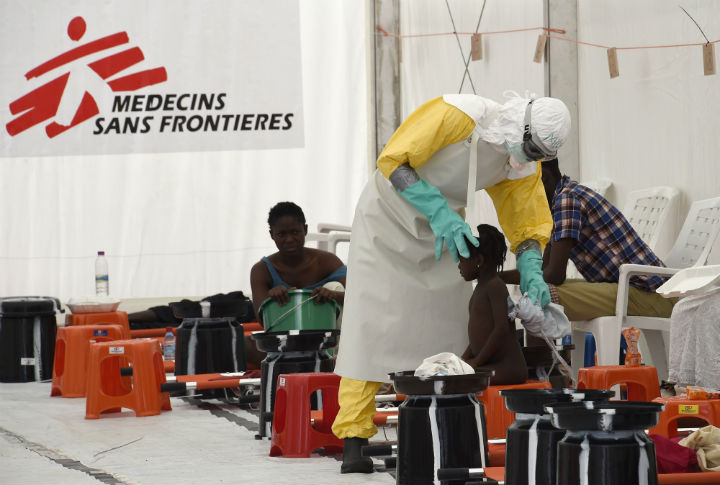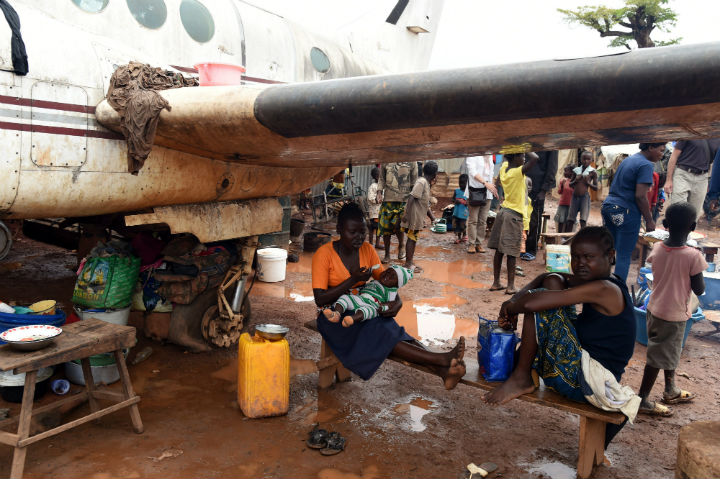Coming off what was an incredibly busy year for Doctors Without Borders, the Canadian doctor who leads organization can foresee what challenges the humanitarian agency may be in 2015.

Montrealer Dr. Joanne Liu said Ukraine and Nigeria are among the top concerns for Doctors Without Borders — also referred to as MSF after its French title Médecins Sans Frontières — going into a new year.
“We have major concerns about Ukraine because we think it will deteriorate,” she told Global News.
Violence between Russian-supported separatist groups in eastern Ukraine and government forces killed nearly 5,000 people in 2014 and injured more than 10,000 others.
“I could be mistaken and I wish I will be mistaken,” she said. “But, we are concerned that it’s going to create enclaves with very difficult access.”
Liu also worries about the humanitarian situation in Africa’s most-populous and wealthiest country — Nigeria.
“For me, it’s a bit of a time bomb, with respect to how things are shifting with Boko Haram,” she said.
Boko Haram, in its violent bid to create a state ruled by strict Islamic law, has claimed responsibility for a series of deadly attacks throughout northern and western areas of the country and kidnapped hundreds of people – most notably, more than 300 girls from a government-run school in the town of Chibok in April.
“With the election coming up, we know it’s going to be fertile ground for increased tension that could fall into violent conflict.”
READ MORE: Killings, kidnappings hard on kids in 2014
Liu has just wrapped up her first full calendar year as the international president of MSF. Eighteen years after first getting involved with the organization, Liu was elected to the position in June 2013 and now works out of MSF’s headquarters in Geneva. She spoke with Global News from Montreal, where she was taking a short eight-day vacation over Christmas, to recharge after what was one of the Nobel Peace Prize-winning organization’s busiest years.
“Just at the outset of it, we started 2014 with the biggest deployment, in terms of resources and operations in the field, in the history of MSF,” she said. “And, that was without Ebola.”
The Ebola epidemic in western Africa required a 20 per cent increase in staffing as the outbreak spread and grew to become the worst on record — more than 7,500 people have died out of nearly 20,000 recorded cases.

Get weekly health news
READ MORE: Canadian Forces start work at Ebola clinic
MSF raised concerns about the unusual nature of this outbreak, compared to previous ones, early on. They got accused of being alarmists and “crying wolf,” Liu said.
“At the outset of the epidemic, one of the things that we said right away was the fact that it was geographically spread, meaning that it was the first time that we were facing an Ebola epidemic that was showing cases in four different spots being separated by more than 200 kilometres.”
The first case appeared in Guinea, followed by Liberia, Sierra Leone and Nigeria. Cases were later transported to Senegal, Mali, Spain and the United States and cases of local transmission occurred. Earlier outbreaks occurred in and were contained to one spot and usually ran their course within four to 12 weeks, Liu explained.
“In the spring, we saw that cases were increasing at a rate that we’ve never seen before and we shared our concerns. And then by June we just said it was out of control, unprecedented. A lot of people were really upset.
“Because of this sort of period of denial and not accepting the situation, to a certain extent by some players, we deprived ourselves of having more people to respond and as well to think about the best response to the Ebola epidemic.”
READ MORE: Doctors Without Borders leaves Ebola-free Liberia region
Among the lives lost in the outbreak were 13 of MSF’s colleagues, Liu said.
The organization also lost people in Central African Republic (CAR), when there was an attack on their premises.
The conflict in CAR was one of the “most intense and violent” of the year, but one that got very little attention.
“It’s what I call the mille-feuille type of conflict,” she explained. “There are so many layers of complexity, in terms of what is feeding into the conflict, that it’s really hard to attract any kind of attention and empathy on it.”
The country has been fractured along religious lines since a coup by Muslim rebels in early 2013 eventually led to retaliatory killings at the hands of Christian militias.
More than 10 per cent of CAR’s population have been displaced — 440,000 internally and a further 190,000 who have fled to neighbouring countries — and more than 5,000 people have been killed in clashes and massacres, according to The Associated Press.
But, she said it was exemplified by some of the challenges MSF faced in providing assistance to people in conflict over the past year, and the disparity between the amount of aid money and aid agencies out there and the actual ability to actually help everyone who needs it.
While displaced people were literally at the fingertips of MSF staff in CAR, even though resources are slim, it’s almost the opposite situation in Syria.
Liu said MSF now only has an “intermittent presence” in Syria, where the civil war has gone on for nearly four years, and the rise of the militant group ISIS has led to even more atrocities.
Liu called it “the biggest humanitarian crisis” right now.
She explained how the situation is so risky that it’s difficult to even get the security warranty for MSF staff and volunteers to go into areas where they’re needed.



Comments